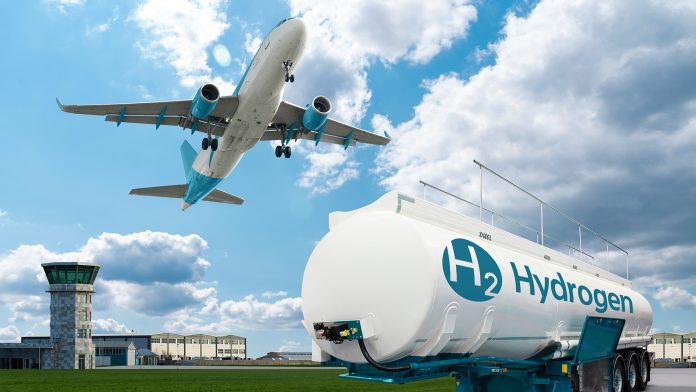Cranfield University will benefit from a £69m funding injection to create the UK’s first major technology hub for sustainable hydrogen aviation fuel.
The funding will be employed to develop the Cranfield Hydrogen Integration Incubator (CH2i), which will innovate world-leading technologies to demonstrate the potential of hydrogen aviation fuel, a landmark move that will help decarbonise the industry.
Research England’s Research Partnership Investment Fund (RPIF) will provide £23m of the funding, with £46m financed through industry partners and academic institutions.
This latest investment brings the total funding from the RPIF scheme to £1bn, with Cranfield being one of four universities that received funding this round.
Embracing hydrogen: A path to sustainable aviation
The demand for air travel is rising, with projections suggesting that UK passenger traffic could surge from 284 million in 2016 to 435 million by 2050.
Without intervention, aviation is poised to become the primary contributor to carbon greenhouse gas emissions by mid-century.
In this context, the swift advancement and expansion of hydrogen-powered aviation are crucial steps toward meeting escalating demands while transitioning to cleaner air transportation.
Aligned with the UK government’s Jet Zero Strategy, which aims for domestic aviation to achieve net zero emissions by 2040, CH2i will aid the aviation sector in exploring the scaling-up of hydrogen aviation fuel.
Professor Karen Holford CBE FREng, Chief Executive and Vice-Chancellor of Cranfield University, explained: “This game-changing investment builds on Cranfield’s expertise in hydrogen research and will help the aviation industry to make the leap to using hydrogen.
“CH2i will integrate with other large industry research areas at Cranfield, including our novel hydrogen production programmes, our Aerospace Integration Research Centre, and the Digital Aviation Research and Technology Centre.
“Working with research and industry partners nationally and internationally, we will unlock some of the most significant technical challenges around the future development and deployment of hydrogen in aviation.
“It’s a very exciting prospect for our researchers, partners and for the aviation industry. It will help to build the pathway to net zero emissions aviation.”
How CH2i will advance hydrogen aviation fuel infrastructure
CH2i will establish a groundbreaking ecosystem at Cranfield aimed at seamlessly connecting the production, integration, and utilisation of hydrogen for achieving net zero aviation.
This initiative not only showcases the industry’s potential for rapid decarbonisation but also lays the foundation for pioneering advancements in hydrogen-based technologies.
By forging a strategic research collaboration, CH2i will be intricately linked with the newly established Centre for Doctoral Training in Net Zero Aviation at Cranfield.

This collaborative environment will serve as a catalyst for the development of crucial technologies, ranging from production techniques to aircraft designs and engines, vital for expediting the adoption of hydrogen aviation fuel.
The initiative will prioritise the establishment of state-of-the-art laboratories, extensive test facilities, and essential airport infrastructure, thus revolutionising the landscape of hydrogen technologies.
Informing policy and regulation
CH2i’s multidisciplinary approach brings together academia, industry stakeholders, governmental bodies, and regulatory authorities.
Through collaborative efforts, CH2i aims to inform and shape policies, services, and regulatory frameworks necessary to realise economic growth and skill development opportunities on regional, national, and international scales.
Investment across the supply chain
Benefitting from Cranfield’s unique position as the sole university in Europe with its own airport and dedicated aviation facilities, CH2i will leverage its controlled airside environment to conduct large-scale demonstrations, testing, and advancement of hydrogen-based technologies.
The initiative will integrate and expand existing facilities at Cranfield, facilitating research and development across the entire hydrogen supply chain, encompassing production, storage, transportation, and utilisation.
Key infrastructure elements
CH2i will boast three infrastructure elements that will be critical to the project’s success:
- Hydrogen Integration Research Centre: Building upon existing infrastructure, this facility will incorporate advanced laboratories for material synthesis and testing, analytical capabilities, and an innovation hub dedicated to piloting next-generation hydrogen technologies, including electrolysis and catalyst development
- Enabling Hydrogen Innovation (Test Area): Investment will be made into two separate test bed facilities, supporting activities related to hydrogen and liquid hydrogen, fuel systems, storage, and propulsion system integration, spanning mid- to high-technology readiness levels
- Developing Cranfield Airport’s Infrastructure: Enhancements to the airport’s infrastructure will bolster its capacity for safe operations and testing hydrogen-powered aviation demonstrators, ensuring a seamless transition towards sustainable aviation solutions
CH2i’s comprehensive approach and strategic investments in infrastructure and research promise to drive significant advancements in hydrogen aviation fuel and technologies.
By fostering collaboration and innovation across various sectors, CH2i is poised to play a pivotal role in shaping the future of sustainable aviation.









